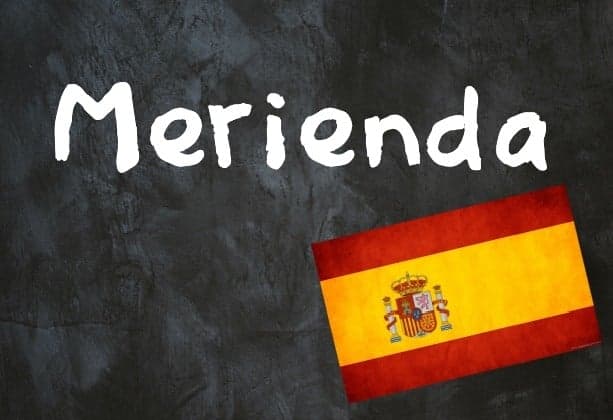Spanish Word of the Day: 'Merienda'

If you like to have more than three meals a day or you're a parent of young children in Spain, this word will come in very handy.
Why do I need to know this word?
Well, you may already know the main meals of the day in Spanish: “desayuno” (breakfast), “comida” (lunch) and “cena” (dinner).
But there’s another small meal which people in Spain have, especially kids.
“La merienda” usually refers to the afternoon snack children (but also adults) have at around 5 o’ clock to keep going before that traditionally late Spanish dinner.
But “merienda” can also refer to any snack that’s eaten in between main meals, so it can be used to refer to a mid-morning or midday snack, not as sophisticated as brunch though (the word “brunch” is widely used in Spain nowadays).
In Spain there’s also “el almuerzo”, which can mean lunch or mid-morning snack.
In Spain “merienda” has more of a connotation of being what children have when they get back home from school. It usually takes the form of a “bocadillo” (baguette/roll) with “embutidos” (cold meats) or some milk and biscuits.
There’s also a verb for this type of snacking: “merendar”.
And in a metaphorical sense, “merendarse a alguien” means to thrash or defeat someone, as if you gobbled them up.
When should I use this word?
If you’re a parent in Spain you may be familiar with this word already.
Usually “merienda” and “merendar” will be used in the context of children having an afternoon or mid-morning snack.
Adults generally won’t meet up to “merendar” together. As mentioned earlier the word “brunch” is probably more suitable if you were to meet up for a late breakfast with friends.
And if you suggested having a “merienda” with friends at 5pm, they may give you some weird looks as the usual thing to do is to meet up for dinner.
Interestingly, the word comes from the Latin verb “merere”, which means to merit or deserve, as in Ancient Rome soldiers were given food in the afternoon for all their hard work during the day.
Can you give me some examples?
Vamos niños, es la hora de la merienda.
Come on, kids. It’s tea time.
Me ha recomendado el nutricionista merendar cuando llegue a casa.
My nutritionist advised me to have a snack when I get home.
El Barça se ha merendado al Real Madrid.
Barça have thrashed Real Madrid.
READ MORE:
Comments
See Also
Why do I need to know this word?
Well, you may already know the main meals of the day in Spanish: “desayuno” (breakfast), “comida” (lunch) and “cena” (dinner).
But there’s another small meal which people in Spain have, especially kids.
“La merienda” usually refers to the afternoon snack children (but also adults) have at around 5 o’ clock to keep going before that traditionally late Spanish dinner.
But “merienda” can also refer to any snack that’s eaten in between main meals, so it can be used to refer to a mid-morning or midday snack, not as sophisticated as brunch though (the word “brunch” is widely used in Spain nowadays).
In Spain there’s also “el almuerzo”, which can mean lunch or mid-morning snack.
In Spain “merienda” has more of a connotation of being what children have when they get back home from school. It usually takes the form of a “bocadillo” (baguette/roll) with “embutidos” (cold meats) or some milk and biscuits.
There’s also a verb for this type of snacking: “merendar”.
And in a metaphorical sense, “merendarse a alguien” means to thrash or defeat someone, as if you gobbled them up.
When should I use this word?
If you’re a parent in Spain you may be familiar with this word already.
Usually “merienda” and “merendar” will be used in the context of children having an afternoon or mid-morning snack.
Adults generally won’t meet up to “merendar” together. As mentioned earlier the word “brunch” is probably more suitable if you were to meet up for a late breakfast with friends.
And if you suggested having a “merienda” with friends at 5pm, they may give you some weird looks as the usual thing to do is to meet up for dinner.
Interestingly, the word comes from the Latin verb “merere”, which means to merit or deserve, as in Ancient Rome soldiers were given food in the afternoon for all their hard work during the day.
Can you give me some examples?
Vamos niños, es la hora de la merienda.
Come on, kids. It’s tea time.
Me ha recomendado el nutricionista merendar cuando llegue a casa.
My nutritionist advised me to have a snack when I get home.
El Barça se ha merendado al Real Madrid.
Barça have thrashed Real Madrid.
Join the conversation in our comments section below. Share your own views and experience and if you have a question or suggestion for our journalists then email us at [email protected].
Please keep comments civil, constructive and on topic – and make sure to read our terms of use before getting involved.
Please log in here to leave a comment.